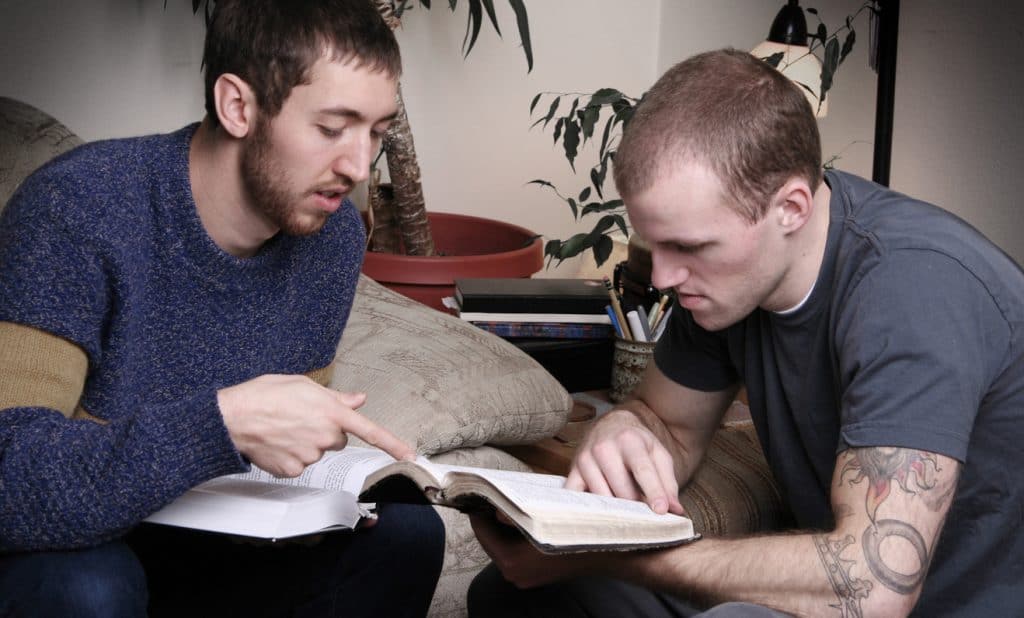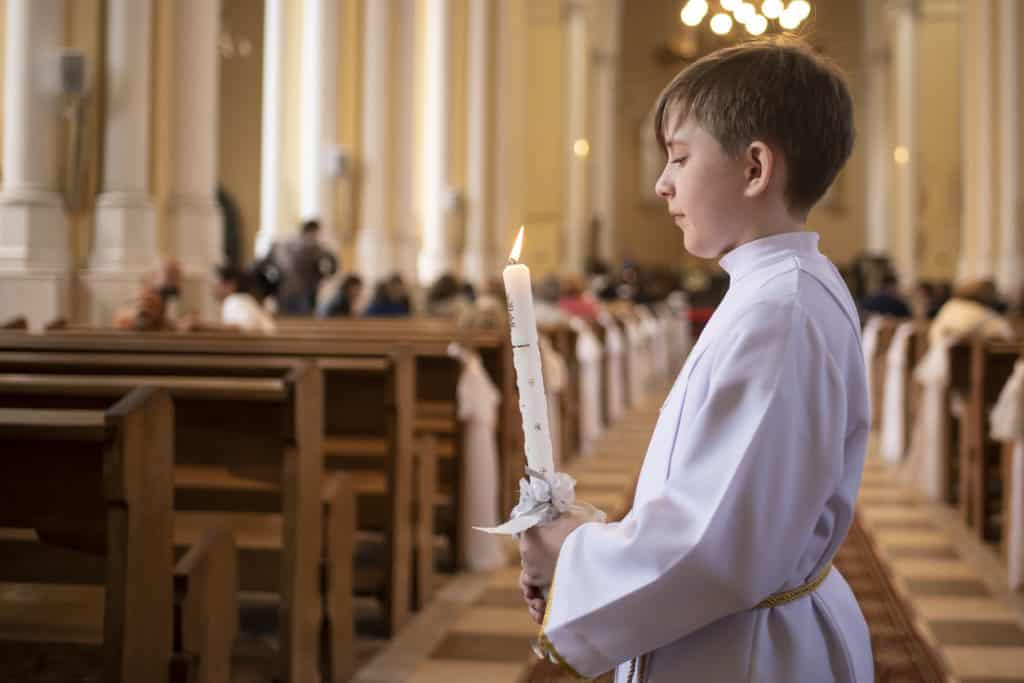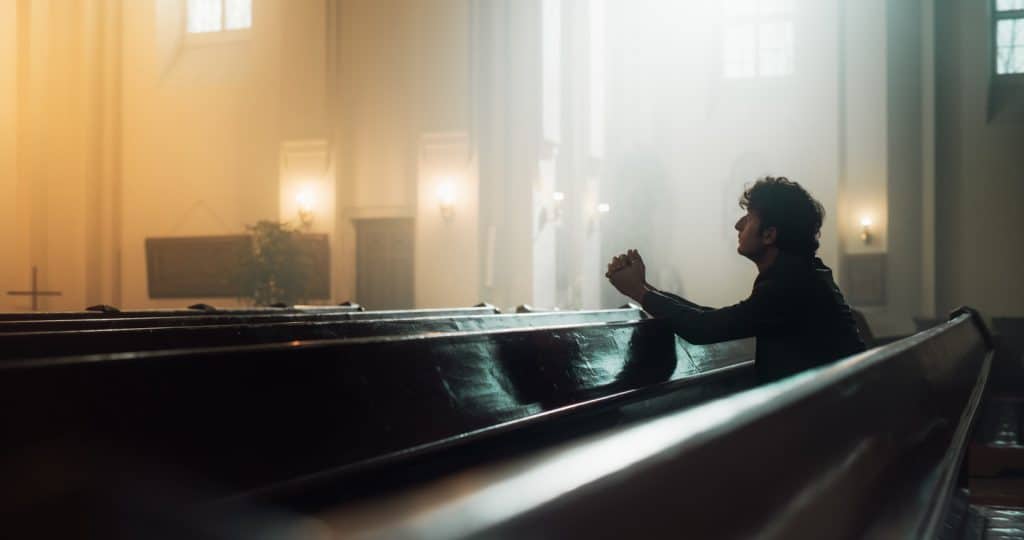The following blog post is based on a sermon given by Chris McKenna at the Wesleyan Church of Hamburg in January 2018. If your church recognizes that porn is eroding the lives of people in your congregation (which we believe it is doing in churches everywhere), please consider setting up a consultation with our Communities Team. We’ve created Communities to help churches just like yours create a plan to push back shame and help set people free.
A deeper understanding of God might be your key to breaking free from addiction.
Preacher C.H. Spurgeon said this about the study of God’s names:
“O, to learn more of the attributes and character of God…By knowing His Name is also meant an experimental acquaintance with the attributes of God, which are every one of them anchors to hold the soul from drifting in seasons of peril. The Lord may hide His face for a season from His people, but He never has utterly, finally, really, or angrily forsaken them that seek Him.”
In other words, the better God is known, the more God will be trusted. I mean, isn’t this true with other relationships? Why wouldn’t it be true for how you interact with our Heavenly Father?
The Fallacy of Secrecy
So much of our behavior is dictated by what we see. What I see impacts my responses to the world around me. It’s equally true that what I think you see impacts my behavior. If I think no one is looking, I sometimes give into temptations to do things in secret that I would never do in the light.
Like no other time in human history, through our digital devices, we have the perceived ability to live with secrets. In fact, two of pornography’s most persuasive lies are:
- You’re not hurting anyone.
- No one will ever know.
How many hundreds of times have you used those as justification?
But, what if we began to believe that no matter what, no matter where we are, even when the lights are off and the door is shut, that we are seen? How might we all live differently if we began to let go of the fallacy of secrecy? What might your daily choices look like if you knew that God truly saw you?
A God Who Truly Sees Us
In Genesis chapter 16, we find the story of Abraham and Hagar who is the slave of Abraham’s wife, Sarah.
It’s a complex and messy chapter. It’s a story that includes slavery, extra-marital relations, and the exploitation of a woman and her infant child.
For background, Abraham and Sarah are married and old. God had promised Abraham that he would be the father of a great nation back in Genesis 12, but now decades later, and married to a barren, elderly woman, the prospect of birthing a great nation looked very unlikely. And so, in an act of desperation, Sarah allows her slave Hagar to provide them a child with Abraham. Let’s pick up the story when Hagar becomes pregnant with Abraham’s child:
When she knew she was pregnant, she began to despise her mistress. Then Sarai said to Abram, “You are responsible for the wrong I am suffering. I put my slave in your arms, and now that she knows she is pregnant, she despises me. May the Lord judge between you and me.”
“Your slave is in your hands,” Abram said. “Do with her whatever you think best.” Then Sarai mistreated Hagar; so she fled from her.
The angel of the Lord found Hagar near a spring in the desert; it was the spring that is beside the road to Shur. And he said, “Hagar, slave of Sarai, where have you come from, and where are you going?”
“I’m running away from my mistress Sarai,” she answered.
Then the angel of the Lord told her, “Go back to your mistress and submit to her.” The angel added, “I will increase your descendants so much that they will be too numerous to count.”
The angel of the Lord also said to her:
“You are now pregnant
and you will give birth to a son.
You shall name him Ishmael,
for the Lord has heard of your misery.
He will be a wild donkey of a man;
his hand will be against everyone
and everyone’s hand against him,
and he will live in hostility
toward all his brothers.”
She gave this name to the Lord who spoke to her: “You are the God who sees me,” for she said, “I have now seen the One who sees me.” That is why the well was called Beer Lahai Roi; it is still there, between Kadesh and Bered.
So Hagar bore Abram a son, and Abram gave the name Ishmael to the son she had borne. Abram was eighty-six years old when Hagar bore him Ishmael.
Hagar called God, EL ROI–the God who sees me.
The God of everything sees little old me. Always available. Never surprised.
Even the most watchful parent has to sleep some. But Scripture makes it clear God never slumbers, never looks one way while we head off in another, never misses a millisecond of what happens on earth.
The realization that we worship a God who always sees us likely elicits a wide range of emotions. For those hurting and desperate like Hagar, it’s the awesome realization that there is no pit too deep or situation too desperate that our God will not jump in and join me. Psalm 46:1 tells us that God is “an ever-present help” when we are in trouble.
But, for those who have secrets, it’s the awful realization that there are no secrets and that every breath of my life is seen by the One who sees me.
Hebrews 4:13 says, “Nothing in all creation is hidden from God’s sight. Everything is uncovered and laid bare before the eyes of him to whom we must give account.”
And, so we have to wrestle in this tension. This tension between compassion and conviction. But, as we explore Hagar’s story further, God’s response to Hagar’s situation speaks to both sides. And, I think it does it well.
God Offers Me Peace
When my circumstances offer me heartache and suffering, the God who sees me offers me peace.
If He sees Hagar then He also sees you. The story of Hagar and her son, Ishmael, is the story of millions of exploited and rejected people around the world.
Do you feel rejected? Do you feel mistreated? Have you run to the false gods of substances, pornography, or wrong relationships as a salve to your hurting soul?
None of us are immune from life’s circumstances. Jesus told his followers to expect trouble. Not just to expect trouble, but to expect outright pain and suffering.
Do you find yourself feeling as though life is saying, “Go ahead, just figure it out”?
Philippians 4:4-7 offers us this, “Rejoice in the Lord always. I will say it again: Rejoice! Let your gentleness be evident to all. The Lord is near. Do not be anxious about anything, but in every situation, by prayer and petition, with thanksgiving, present your requests to God. And the peace of God, which transcends all understanding, will guard your hearts and your minds in Christ Jesus.”
Ask: “Do I believe that no matter what the situation, that it is possible to be anxious for nothing, pray about everything, and be thankful for anything?”
David Guzik said, “It isn’t that it is senseless and therefore impossible to understand [God’s peace], but that it is beyond our ability to understand and to explain–therefore it must be experienced.”
Writer Ann Spangler said, “If you are feeling weak in the face of life’s challenges, the best way to grow strong is to strengthen your commitment to Christ. Decide to obey fully, to follow completely, to keep your eyes fastened on him. Let El Roi take pleasure as he watches over you, and you will soon find your heart stronger and your confidence deeper without quite knowing how it happened.”
God Offers Me Blessing
The second thing Hagar’s story teaches us is: when I consistently choose faithfulness, the God who sees me offers me blessing.
There’s a danger in knowing that God is “the One who sees me.” You can be deceived into thinking that a God who sees me waits in anticipation for my mistakes so that He can punish me. When instead, a God who sees me waits with patience for my faithfulness so that He can bless me. And, bless me abundantly.
Holy Scripture assures us God is on the lookout for men and women who are totally committed to him. Why? Because he wants to strengthen their hearts as they serve him.
“For the eyes of the LORD range throughout the earth to strengthen those whose hearts are fully committed to him.” (2 Chron. 16:9)
Guardrails Strengthen Our Commitment
In most areas of our life we have guardrails and people helping us remain accountable as we work toward certain goals. Financial advisors. Personal trainers. Maybe even an app or our FitBit encouraging us to hit certain achievements.
Yet 24-hours a day, seven days per week we are online, with virtually no one watching. This is why the loving guardrails of accountability are so critically important. They crush the fallacy of secrecy, and keep our digital behaviors in the light, where they can be measured and kept pure and holy.
Th internet is a crowd-sourced morality. Therefore, in order to use it well, it must be controlled and brought into submission so that we can consistently choose digital faithfulness.
You aren’t strong enough to handle technology alone. You can’t handle what it is.
I pride myself on having a strong work ethic and for being a self-starter. I’ve always enjoyed accomplishing a list of to-do’s–even adding things that I’ve already accomplished to a list just so I can cross them off. I recently re-took Tom Rath’s Strengths Finder survey, which had “achiever” at the top of my strengths list. Valedictorian of my high school class. Varsity athlete. Suma Cum Laude and Presidential Scholar in college. Learned a foreign language. Accomplished CPA and business advisor for Fortune 500 companies. Loving husband. Father of four amazing children.
But, I was powerless against online pornography. For over a decade, it ruled me. And, for some of you younger readers, whether it’s your inability to take the perfect selfie, or your compulsion to keep the Snapstreak going, you too are powerless.
In the book, The Disciple Making Pastor, Bill Hull writes about the need for accountability in the disciple-making process. He says, “To believe you can make disciples or develop true maturity in others without some form of accountability is like believing that you can raise children without discipline, run a company without rules, or lead an army without authority. Accountability is to the Great Commission what tracks are to trains.”
Listen, I don’t have to obey God. I get to honor the God who sees me with every moment.
I don’t have to guard my eyes from online filth. I get to honor the God who sees me and my family with every click.
I don’t have to protect my heart from temptation. I get to choose a life of integrity because the God who sees me chose me before I ever looked His way.
EL ROI–the God who sees me. Not keeping track of my wrongs. But, patiently waiting for me to choose right. As we read about in the story of the prodigal son, he’s a Father, maybe on his tiptoes with his hand over his eyes, scanning the horizon in hopeful anticipation of his son’s return, who takes off in a dead sprint to meet him at the first glimpse of him coming home.
He’s on the lookout for men and women, teens and tweens, who are totally committed to him. Why? Because He wants to strengthen your heart, and build you up, and in a world of fear and chaos, turn you into a fearless man of strength. A warrior princess with courage. That’s the God who sees me. That’s the God who sees you.








I am at the inception stage of learning to Honor God in all things. I am praying for a renewed mind or the mind of Christ. These articles ared materials a true blessing. These tools I am determined will be a major part of ministry and should always be taught to help other believers to live a powerful life for God. Chris you honest testimony is saving many lives. Blessings, Prosperity, Promotion and Faithfuless in God for our lives as we seek the Kingdom and obey and turn from and overcome traps from the enemy. To God be the Glory!
Thank you Chris for this article. We are beyond the “secrecy” stage, and viewing hard porn. we regularly share and talk about the blogs that are sent out…big help! But my husband still thinks that soft porn (the cheerleader buttons)—ex. skimpy bikini models, costume malfunctions, who is having sex with whom, etc. are okay. I wish covenant eyes would address this issue more fully.